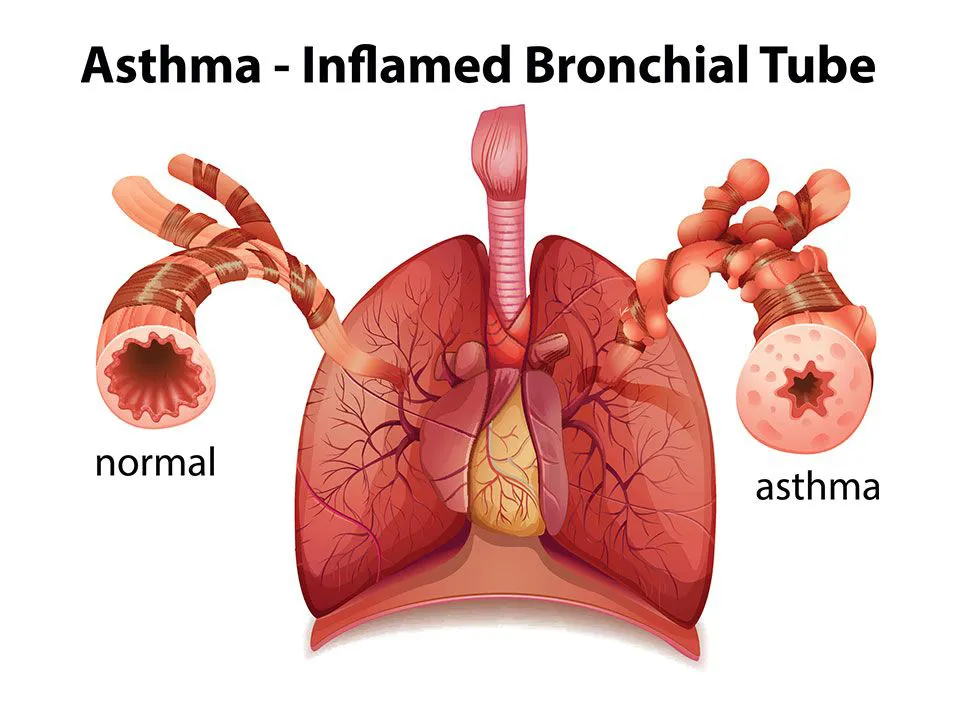| Asthma Resource Guide
What is Asthma?
Asthma is a condition in which your airways narrow and swell and sometimes produce extra mucus. When you have an asthma attack, you may begin to cough and make a whistling or wheezing sound when you breathe in and out. You also may experience difficulty breathing (e.g., shortness of breath). If you have allergic asthma, then the attack occurs as the result of an allergy trigger.

What Are The Different Types Of Asthma?
There are several types of asthma, including:
Adult-Onset Asthma
Asthma is not necessarily a hereditary condition. It may develop later in life, especially if you have been exposed to chemicals that damage your respiratory system at some point in your life.
Exercise-Induced Bronchoconstriction
Exercise-induced asthma generally refers to abnormal shortness of breath after vigorous exercise.
Allergic Asthma
Allergic asthma is asthma triggered by exposure to specific allergens, such as pollen or fur.
Non-Allergic Asthma
This type of asthma may be congenital or caused by other external factors besides allergens (like a viral infection or an extreme change in weather).
Occupational Asthma
This kind of asthma develops in people whose work conditions put their respiratory system at high risk of infection or exposure to allergens (e.g., manufacturing, mining, farming, etc.)
Asthma-COPD Overlap Syndrome (ACOS)
ACOS occurs when someone has both asthma and COPD (Chronic Obstructive Pulmonary Disorder). ACOS is a rare condition, but it does happen to some people.
What Happens During an Asthma Attack?
An asthma attack may be mild, but it could also be a very frightening experience. At least one sufferer has compared an asthma attack to “drowning in air.”
During an asthma attack, the muscles around the bronchial tubes tighten. In turn, this narrows the air passages that connect your mouth and nostrils to your lungs, making it very hard to breathe. You may also experience wheezing and a rattling sound in your chest.
Some asthma attacks last only a few minutes; others may last hours or even days. Mild attacks may resolve on their own, while severe attacks may require immediate medical attention.
What Should You Do if Someone Has an Asthma Attack?
If someone you know experiences an asthma attack, there are things you can do to try to help the situation. Take the following steps:
-
Stay calm, and help the other person stay calm and breath at a steady, even pace. An asthma attack can become worse if the sufferer panics.
-
Remove the person from possible asthma triggers, such as smoke or an area with flowers.
-
Have the person sit upright, do not let them lie down
-
If the person can talk, ask what their asthma action plan says to do during an attack.
-
Ask if the person has an inhaler to use during an attack. If so, retrieve the inhaler for the person and help them to use it. There should also be prescription instructions on the inhaler.
-
Call 911 immediately if the inhaler doesn’t help (or only helps at first), if the inhaler is unavailable, if the person is struggling to talk and breathe, if the person’s lips start turning blue, or if the person becomes unconscious.


What Should You Do if Someone Has an Asthma Attack?
If someone you know experiences an asthma attack, there are things you can do to try to help the situation. Take the following steps:
-
Stay calm, and help the other person stay calm and breath at a steady, even pace. An asthma attack can become worse if the sufferer panics.
-
Remove the person from possible asthma triggers, such as smoke or an area with flowers.
-
Have the person sit upright, do not let them lie down
-
If the person can talk, ask what their asthma action plan says to do during an attack.
-
Ask if the person has an inhaler to use during an attack. If so, retrieve the inhaler for the person and help them to use it. There should also be prescription instructions on the inhaler.
-
Call 911 immediately if the inhaler doesn’t help (or only helps at first), if the inhaler is unavailable, if the person is struggling to talk and breathe, if the person’s lips start turning blue, or if the person becomes unconscious.
What Are the Risk Factors for Asthma? Is Asthma Genetic?
Asthma is not exclusively a hereditary condition. However, it can have a vital genetic component, especially if your family has a history of suffering from asthma. One study found that genetic factors may account for up to 70% of a person’s risk of developing asthma.
Risk factors for developing asthma include:
-
Genetic factors (asthma “runs in the family”)
-
Existing allergies
-
Smoking or being exposed to cigarette smoke
-
Occupational asthma (working around substances known to be lung irritants and asthma triggers)
-
Living a sedentary lifestyle
While genetic factors often play a crucial role in whether a person develops asthma, exposure to irritants and allergens “on the job” may account for up to 15% of asthma cases in the United States alone.

What are the Symptoms of Asthma? How Do You Know if You Have Asthma?
Some common asthma symptoms include the following:
-
Feeling shortness of breath
-
Tightness in the chest or pain
-
Coughing attacks that are worsened by a respiratory virus, such as the cold or flu
-
Wheezing when breathing out (this often occurs with children who have asthma)
-
Difficulty sleeping as a result of shortness of breath, coughing, or wheezing
If these symptoms begin to become more frequent or severe, then it may not only indicate that you have asthma but that your asthma is worsening. Of course, if you’re unsure whether you have asthma or not, you should see a board-certified allergist who can provide you with an accurate diagnosis.
In addition, your allergist may recommend that you use an asthma-measurement tool called a Fractional Exhaled Nitric Oxide (FeNO) machine. When you breathe into a FeNO machine, it reads the amount of inflammation in your lungs and gives you a corresponding number. That number can help you and your allergy doctor determine if your asthma is under control.
What Can Trigger An Asthma Attack?
There are several things that can trigger an unexpected asthma attack. These include:
-
Dust mites. These are microscopic bugs that can be found in many homes. If you are allergic to dust mites, they may cause you to experience an asthma attack.
-
Mold. Breathing in the mold may trigger an asthma attack whether or not you’re allergic to it. Indoor mold growth will often release spores that travel throughout your home’s ventilation system, enter into a room after room, and finally invade your respiratory system.
-
Other allergies. Pollen, animal fur, and a host of other substances can cause you to have an asthma attack if you are allergic to them.
-
Tobacco smoke. Tobacco smoke is not only unhealthy for your lungs in general, but it is also an irritant that frequently causes (or aggravates) asthma.
-
Medications. Certain medications (such as non-steroidal anti-inflammatory drugs or NSAIDs) can cause or worsen asthma symptoms.
-
Heartburn. Acid reflux from the stomach can negatively impact the lungs and make people who suffer from asthma more sensitive to other triggers, such as air pollution and tobacco smoke.
-
Cold and flu. Research indicates that the common cold can cause an increase in a protein called IL-25 in the cells around the airways. This increase leads to an inflammatory response, similar to an allergic reaction.
-
Stress. Modern medicine points to stress as a root cause for many cardiovascular, gastrointestinal, and immune system issues, among other health problems. It’s well known that extreme stress can result in a feeling of airway constriction (i.e., difficulty breathing). Stress may trigger an asthma attack or make an asthma attack even longer and more severe than it would be otherwise.
-
Spring. One of the culprits most commonly blamed for asthma attacks is springtime — complete with a high pollen count and significant fluctuations in temperature and humidity.
-
Colder weather. In many places, wintertime and dry air go hand in glove. Unfortunately, dry air is one of the more common asthma triggers.
What are Common Asthma Treatments and Asthma Medications?
In most cases, asthma is treated with handheld inhalers (either bronchodilators or anti-inflammatory medications). These inhalers are usually sufficient to treat asthma attacks.
However, in more severe cases, an allergy doctor may prescribe the use of an anti-IgE treatment known as Xolair. This medication is given as a subcutaneous injection 1-2 times per month. It is designed to suppress the body’s IgE antibodies that cause allergic reactions. Xolair and related medications are typically only given by allergists or asthma specialists, not primary care providers.
Immunotherapy (allergy shots) is a third treatment option for asthma. Over time, these allergy shots may help your body become immune to specific allergy triggers. At the start, you’ll be injected as frequently as twice a week. However, the interval between injections will gradually lengthen, and you’ll eventually only need an allergy shot once a month.
What is an Asthma Action Plan?
An asthma action plan is a course of action set out in advance to help you, your family members, and others around you react quickly and effectively in the event of an asthma attack.
If you have young children going to school, it may be wise to tour the school before their first day and identify any potential asthma triggers they may encounter. Let their teachers and the school nurse know about their condition, and loop them into your action plan.
If your children are high-school or college-bound, make sure they know their asthma triggers, pack their inhaler, and thoroughly clean their locker or dorm room before unpacking and regularly after that.
To keep your home “asthma-friendly,” make sure to monitor your indoor air quality, and use a humidifier (or dehumidifier) to keep moisture levels under control. If you have an indoor pet, keep it neat and well-trimmed. You may even need to confine your pet to a particular section of the house. Finally, keep a written asthma action plan in an easily accessible place in your home for quick reference.


What is an Asthma Action Plan?
An asthma action plan is a course of action set out in advance to help you, your family members, and others around you react quickly and effectively in the event of an asthma attack.
If you have young children going to school, it may be wise to tour the school before their first day and identify any potential asthma triggers they may encounter. Let their teachers and the school nurse know about their condition, and loop them into your action plan.
If your children are high-school or college-bound, make sure they know their asthma triggers, pack their inhaler, and thoroughly clean their locker or dorm room before unpacking and regularly after that.
To keep your home “asthma-friendly,” make sure to monitor your indoor air quality, and use a humidifier (or dehumidifier) to keep moisture levels under control. If you have an indoor pet, keep it neat and well-trimmed. You may even need to confine your pet to a particular section of the house. Finally, keep a written asthma action plan in an easily accessible place in your home for quick reference.
What Should You Know if You Have Asthma and Live in Boise, Idaho?
If you have asthma and live in (or are moving to) Boise, Idaho, here are some resources that can help you minimize your risk of experiencing an asthma attack:
-
How Does Boise Air Quality Affect Asthma?
-
Moving to Boise, Idaho? Here’s What You Need to Know About Allergies & Asthma in Boise
-
Why You Should See an Allergist for Asthma
The most important thing you can do to find relief for your asthma is consult with a qualified allergist. Your allergist can perform a series of tests to pinpoint your asthma triggers, prescribe the medical treatment you need, and help you make positive lifestyle changes that will help you enjoy the highest quality of life with asthma.
At The Allergy Group, our experienced and caring asthma specialists stand ready to provide whatever assistance you need. We have locations throughout the Boise Valley, including:
-
Boise – 1000 N Curtis Road, Suite 303, Boise ID 83706
-
East Boise – 161 E. Mallard Dr. Suite 130, Boise, ID 83706
-
Meridian – 2273 E. Gala St, Suite 110, Meridian ID 83642
-
Eagle – 323 E. Riverside, Suite 220, Eagle, ID 83616
-
Nampa – 1603 12th Ave Rd Suite D, Nampa, ID 83686
-
Caldwell – 211 E Logan Street, Suite 305, Caldwell, ID 83605

